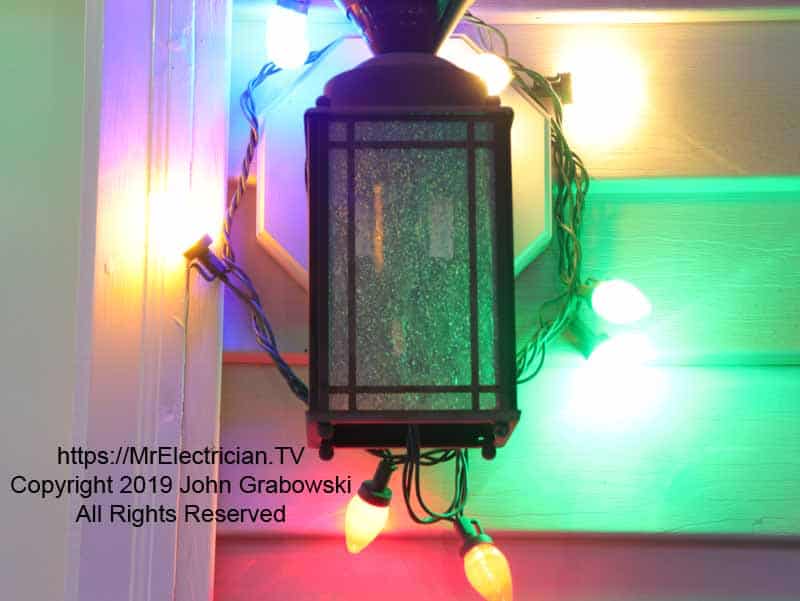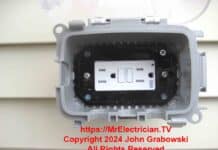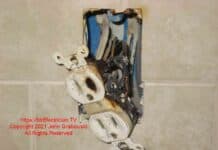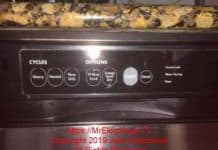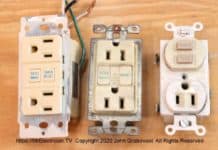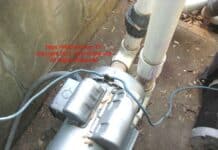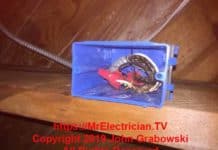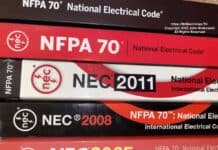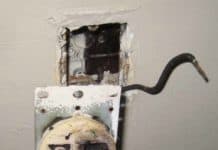Dear Mr. Electrician: What are some holiday safety tips? I want to ensure my home is safe from fire and electrical shock for the holidays. My family wants to set up elaborate decorations, but we don’t have any outside electrical receptacle outlets to plug our extension cords in.
Answer: Below is my ongoing list of holiday safety tips. Extension cords are usually used to deliver power where it is needed temporarily, but they must be used correctly.
NOTE: Some text links below go to applicable products on Amazon. As an Amazon Associate, I earn from qualifying purchases. Using my links helps to keep this website FREE.
Finding a source of temporary electrical power and laying extension cords down in a safe manner can be tricky. I have seen a variety of methods to get power to outside holiday decorations, and many of them were unsafe.
Sometimes, the cords are run through windows or under doors and are plugged into indoor electrical receptacle outlets that are the most convenient but have no additional protection from the circuit breaker beyond a circuit overload or short circuit/ground fault condition.
AFCI/GFCI circuit breakers do have additional protection against fires and electrocution. Talk to an electrical contractor about making your home safe by installing some.
Going through door and window openings could cause an extension cord to become damaged and possibly energize a metal frame.
Do not run an extension cord through a window or door. Also, any cord for outdoor use should be plugged into a GFCI-protected electrical receptacle outlet.
In a client’s garage, I once saw how he had plugged an extension cord into a ceiling electrical receptacle outlet. He stapled the cord across the ceiling to a side window where he had a power strip plugged into the cord end. The outside Christmas light cords came through the window and plugged into the power strip.
There was no GFCI protection, and he had the window closed down on the cords, which can damage the cord insulation. Do not do this at your home! Portable extension cords must not be used as a permanent installation. The insulation on the cord is not rated for that type of use, and it will eventually fail.
Below is my ongoing list of holiday safety tips. Many of which apply all year round.
TIPS TO PREVENT FIRE AND ELECTROCUTION
If installed correctly, extension cords and holiday decorations can bring some holiday excitement to your household. If done wrong, fire, electrical shocks, and even death by electrocution become possible.
Extension cords should be properly sized for the load they will carry. Cords should be 14 or 12 gauge (12 is larger than 14 and can carry more electrical current). If using an extension cord outside, it should be rated for outdoor use.
Outdoor extension cord wiring must be plugged into an electrical receptacle outlet that is GFCI-protected to help reduce shock hazards and electrocution. Portable GFCI protection devices are available. Do not use power strips outdoors unless they are rated for outdoor wet locations.
To reduce nuisance tripping of the GFCI from outdoor decorations, elevate the plugged connections between extension cords, tree lights, and other decorations so that they don’t lay directly on the ground.
Drape the plugged connections on top of a piece of wood or a log to keep them off the ground. This will keep water from rain or snow directly entering the plugs. It will also allow the plugs to dry faster when the sun comes out.
I do not think wrapping plugged electrical connections in plastic bags is a good idea. Condensation can build up inside the bag and cause arcing.
Electric Christmas lights and decorations that are used indoors should be AFCI and GFCI-protected. Arc Fault Circuit Interrupters will help protect against arcing and sparks, which can create fires. Ground Fault Circuit Interrupters will help protect against electrical shocks and electrocution.
It is now possible to purchase dual-function electrical receptacle outlets that have AFCI and GFCI protection in one electrical receptacle outlet. They also can provide protection for all electrical outlets downstream of the device. A qualified licensed electrician should install these.
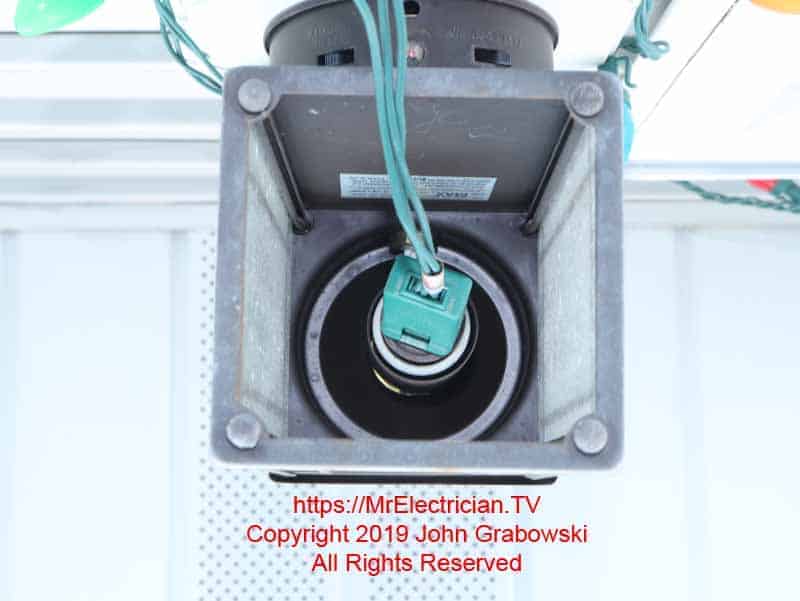
Electrical power should not be taken from an outdoor light fixture by using a plug adapter screwed into the lamp socket. Light fixtures are wired to carry only enough electrical current to safely supply electrical power to the light bulb socket.
The light fixture is rated for a limited amount of watts. Exceeding that capacity by adding Christmas lights or decorations can cause a fire. This is especially concerning as many outdoor light fixtures are mounted on the house. If a fire started in the light fixture, igniting the house from there would be very easy.
Portable electric heaters around the home for supplemental heat might cause problems. High-wattage heaters can get plugged into outlets and circuits that are hardly used most of the year. This could initiate arcing on electrical connections that worked okay with a small load during the previous months.
Keep an eye out for flickering household lights. Feel the plug at the wall outlet when the heater is on. A little warmth is normal, but if it is too hot to touch, there’s a problem. Arc Fault Circuit Interrupters can help prevent fires from overheating wires due to sparks and arcing.
Click to read my blog post about Arc Fault Circuit Interrupters.
Caution should be used when operating a portable electric heater in the home. Be sure that the wattage rating of the heater does not exceed the capacity of the circuit wiring it will be connected to. A good rule of thumb is to keep the heater size to 80% or below the electrical circuit capacity.
For instance, the average electrical circuit in a home is rated for 15 amps, which at 120 volts can handle up to 1800 watts. 80% of this is 1440 watts. A 20 amp circuit normally wired into kitchens and dining rooms can use a 1920-watt heater (80% of 2400).
When calculating the total electrical load for the circuit, other appliances, devices, and lights connected to the same circuit must be considered.
Electric heaters must be kept from combustible materials such as curtains and furniture. Read the manufacturer’s instructions for the proper placement of your heater.
Kerosene heaters should not be used indoors. There is a high risk of carbon monoxide poisoning from them when used inside.
Electrical receptacle outlets not normally used during the year but used heavily during the holidays can create problems. Sometimes, older electrical receptacle outlets have loose wire connections inside the wall or loose internal contact prongs where the inserted plug makes contact.
Both of these situations can become hazardous as an electrical load is connected. The increased power draw on loose connections will generate heat and sparks, which can lead to a fire. Arc Fault Circuit Breakers can reduce the fire hazard by shutting power off at the first sign of a spark. Talk to a qualified licensed electrician about installing AFCI circuit breakers in your home’s electrical panel.
Check to make sure that the electrical decorations that you buy, as well as the needed accessories, are laboratory-tested for use. They should have a UL tag or the mark of some other electrical testing laboratory. A red UL tag indicates that lights are approved for indoor or outdoor use. Green UL tags indicate indoor use only.
A testing laboratory label indicates that the manufacturer paid the testing laboratory to test their product for its intended use and that it passed the tests. Be sure to follow the manufacturer’s directions for using their product.
Do not hammer tacks or nails into electrical cords.
Turn off your holiday lights when going to bed. Do not leave them unattended when on.
Refrain from lighting up candles. Do not put lit candles on Christmas trees in the window or anywhere a child or pet could knock them over. Flameless battery-powered candles are available.
OTHER SAFETY TIPS
Wear shoes. Protect your feet when setting up decorations and climbing ladders. Always wear shoes when working around your home.
Use a ladder. A household hazard that becomes more apparent around the holidays is falls. When hanging decorations around the house, use a ladder to get up high.
Do not stand on a chair, a step stool, a table, a bucket, or anything not intended to elevate you safely. Use a properly sized ladder to get to where you need to. One bad fall can ruin your holiday now and forever.
Keep small children and pets away from the Christmas tree and other decorations and displays. They tend to put things in their mouth, which could lead to them swallowing an object. Artificial Christmas trees are treated with chemicals to make them attractive and fire-resistant. You don’t want your children or pets ingesting chemicals.
Pets like to chew on things such as electrical cords. Plug all electrical cords into electrical outlets that are GFCI and AFCI-protected to reduce the possibility of electric shock, electrocution, and fire.
Wash your hands. Setting up holiday decorations and wrapping gifts involves coming in contact with all kinds of chemically treated and dyed products. Wash your hands often.
Wear a face mask out in public and in groups. It has been proven effective in reducing the passing of germs. If you welcome guests into your home for the holidays, consider safety precautions for everyone. Have masks available for your guests. If you shake hands with many people, wash or sanitize your hands often.
Carbon monoxide poisoning tends to show up more when it is cold outside. With the windows shut tightly to keep the cold out, less fresh air enters the house. If there is carbon monoxide present from a faulty heating system or an appliance, it can kill you and your family while you sleep. Install carbon monoxide detectors in all of the bedrooms.
Do not run a kerosene heater in your home, including the basement. Do not operate a portable generator inside of your home, including the basement. Keep a portable generator outside and away from windows when running.
Smoke alarms. There have been many instances where I have seen smoke alarms missing from the ceiling electrical box, dangling by a wire, yellowing from age, or not working. Ensure you have working smoke alarms at all times, not just for the holidays. They do save lives.
If you have had many false alarms due to cooking, try replacing your smoke alarms with a photoelectric type of smoke alarm. Most home builders install nuisance-prone ionization-type smoke alarms because they are cheaper.
There is nothing wrong with ionization smoke alarms, they work well, but they are prone to nuisance alarms from cooking. Photoelectric type smoke alarms are less likely to activate from minor cooking smoke.
A smoke alarm that combines ionization and photoelectric sensors offers the best warning of a fire and is probably best used in bedrooms and other sleeping areas away from cooking smoke and bathroom steam.
Refrain from giving live animals as gifts. Historically, sometimes the outcomes for pets received as gifts are not always happy ones. Read this brief statement from the American Society for the Prevention of Cruelty to Animals (ASPCA) for guidance on animal gift-giving.
Do not give your pets human food. I know they like it and are part of the family enjoying themselves and the goodies. However, food that we eat is not always good for animals. Look online or check with your veterinarian about what pets can and cannot eat.
Lock your guns! Accidents with firearms happen too frequently. If you will entertain guests in your home, lock your guns up. Kids and adults tend to wander, which can cause an accident. If you need a gun when you have family and friends visiting your home, perhaps you should revisit your guest list.
I suggest leaving your gun at home when visiting someone’s home. However, if you feel the need to carry with you at social events, use a gun lock or a lock box. Keep your gun locked when leaving it in a car.
Please do not drink or smoke, and then drive. Your life and the lives of others may change forever in a very bad way if you do. Also, do not work around the house while under the influence. You could get hurt.
For Halloween, when you and your children walk outside in the dark, I think carrying a flashlight or wearing a headlamp is important. This not only helps you to see in the night, it also helps others to see you.
When the days get shorter and the nights are longer, it is a good idea to wear high-visibility clothing when going for walks or runs in the dark. Some drivers have difficulty seeing in the dark, particularly with glaring headlights coming at them.
After a heavy storm, electrical utility power lines can be down and lying on the ground or street. DO NOT TOUCH THEM. It is quite possible that even though they are on the ground, they will be energized.
The downed power lines will have a much higher voltage than what is in your home and can fry your body in an instant. Your body will cook from the inside out.

Read my blog post about the effects of electricity on the human body.
Read what the Government has to say about holiday safety tips. There are thousands of injuries each year due to holiday decorating.
For more holiday safety tips, read my post about safety when working around your home, which should be read by all DIYers.
To help keep this website FREE, please use this Amazon link for your purchases. As an Amazon Associate, I earn from qualifying purchases.
Click for a FREE copy of my book “Almost Everything You Need To Know To Repair a Bathroom Exhaust Fan In Your Home.”
Get your required “Emergency Disconnect, Service Disconnect” labels and stickers to satisfy the 2023 National Electrical Code requirements in article 230.85(E)(1) by going to my shop here.
Visit my Link Tree for links to my YouTube videos, social media, electrical supplies, merchandise, and more free electrical wiring information.
Have a happy and safe holiday season all year long,
John G
